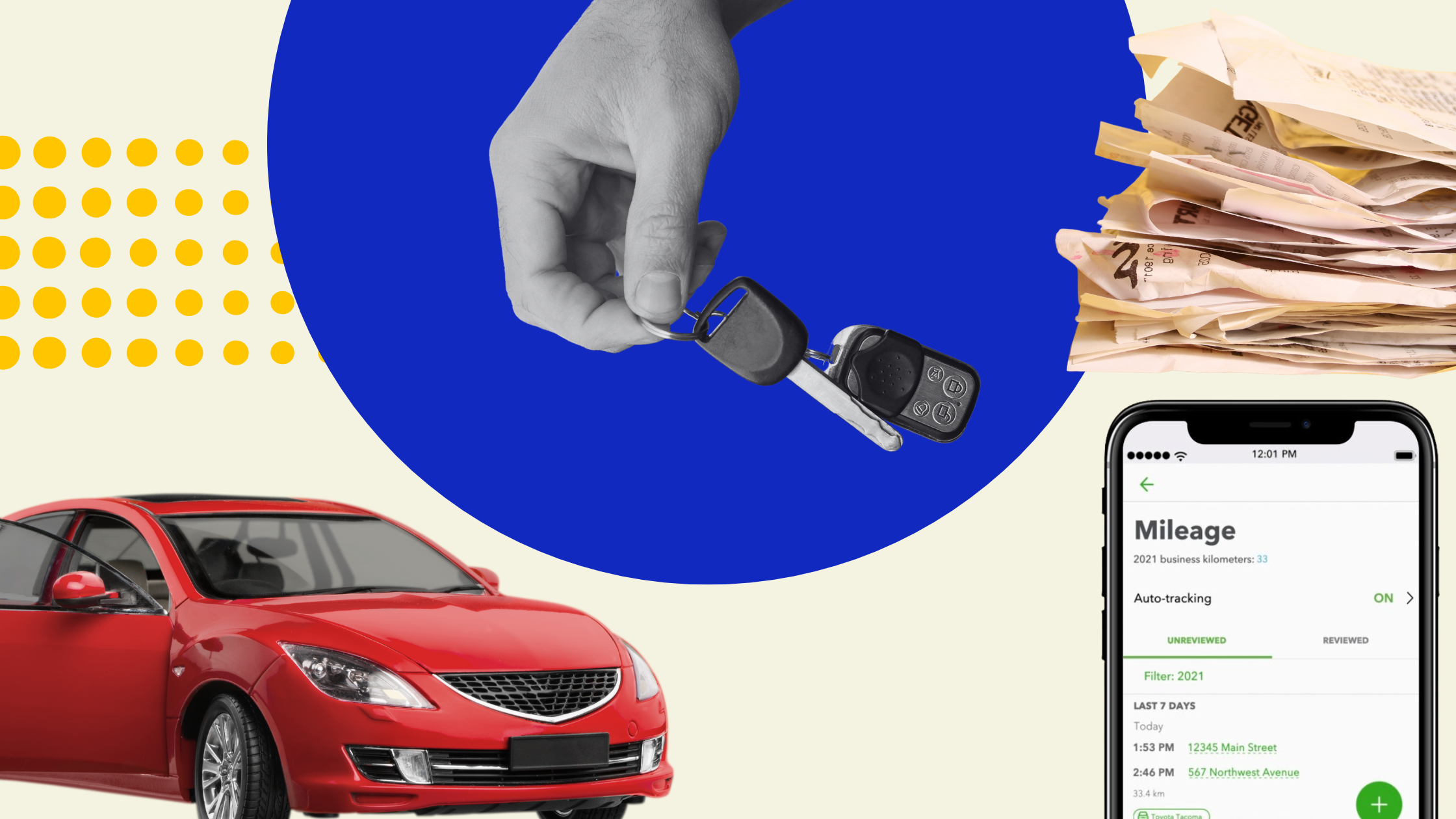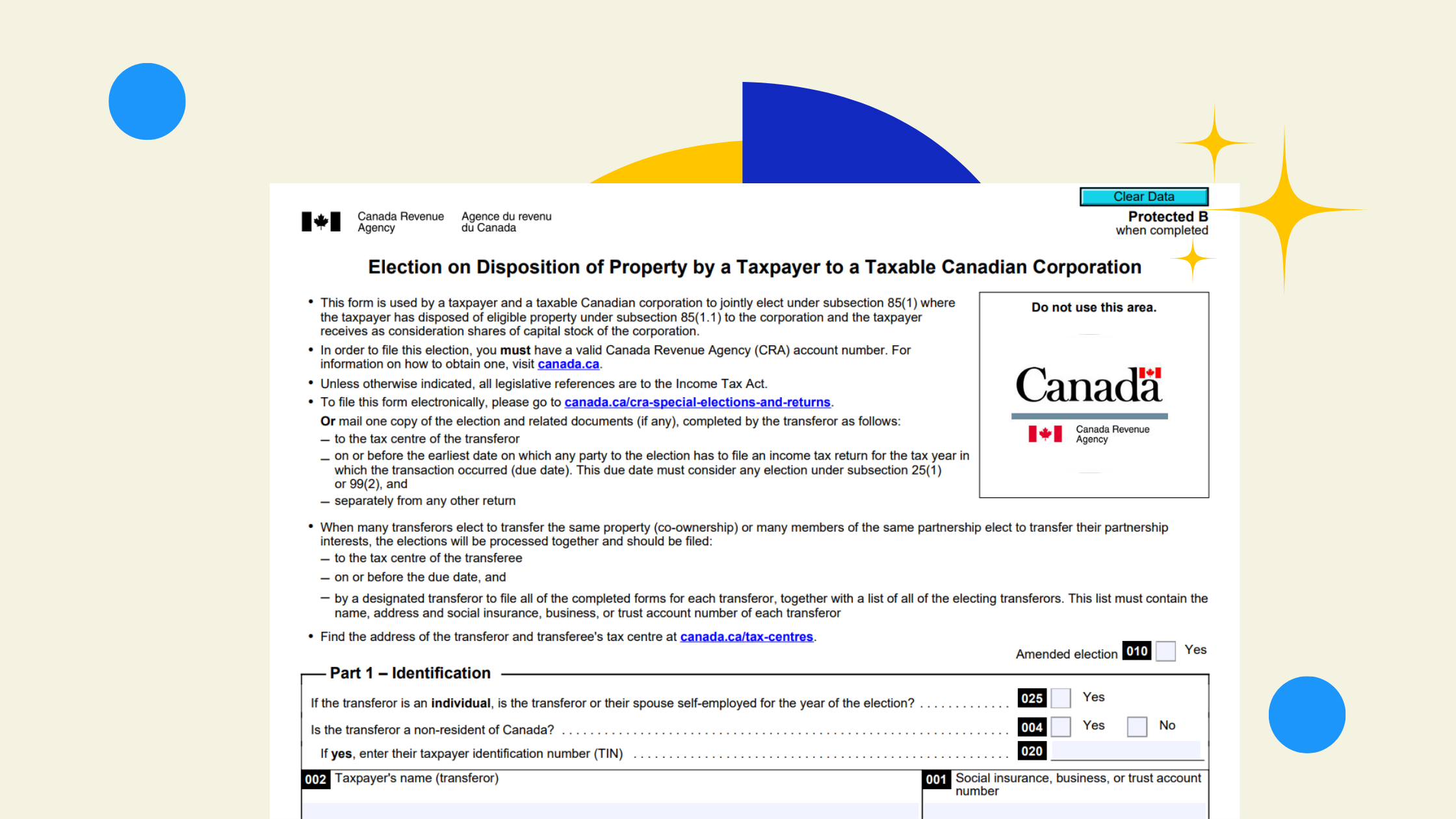Using your vehicle for business comes with tax benefits, but it’s not automatic—you need to do the work to claim what’s allowed. From tracking mileage to deciding between leasing and owning, understanding how vehicle deductions work can save you money and keep you compliant with CRA rules.
In this guide, we’ll cover:
- What expenses you can deduct.
- How to separate business and personal use.
- Tools and tips to simplify the process.
Let’s get your vehicle deductions running smoothly!
Understanding Your Motor Vehicle Deduction Options
Before diving into tracking and claiming deductions, it’s crucial to understand the two main approaches for vehicle deductions:
- Buy a Vehicle Under the Company for Business Use:
-
- This is often a good option if the vehicle will primarily be used for business purposes.
- When it makes sense: High business-use percentage, such as company vehicles for for service professionals traveling daily between client locations or delivery businesses.
- When it’s not ideal: If the vehicle will see substantial personal use or if the upfront and maintenance costs outweigh the tax benefits. Many people believe this is always the best approach, but it’s not universally true.
- Personal Vehicle used for business:
-
- This is the most common scenario for small business owners.
- You can only deduct expenses directly related to business use, which means accurate tracking and allocation of costs are essential.
Mixed-Use Vehicles: What are deductible car expenses?
With mixed-use vehicles, it’s important to separate deductible business expenses from non-deductible personal ones.
Business-Related Travel (Deductible):
- ✅ Traveling to meet clients
- ✅ Delivering goods or supplies
- ✅ Traveling between job sites or office locations
- ✅ Attending industry conferences, trade shows, or networking events
Personal Travel (Non-Deductible):
- ❌ Commuting between your home and your primary workplace
- ❌ Driving to non-business-related social events or errands
- ❌ Family vacations or leisure trips
Documentation Is Essential
For mixed-use vehicles, the CRA requires clear evidence of business use to substantiate deductions. This means tracking each business-related trip with mileage logs and keeping accurate records and receipts for expenses like fuel and maintenance.
Pro Tip: Be prepared to prove that personal trips are excluded from your claims. Keeping accurate and separate records helps you stay audit-ready.
Types of Vehicle Expenses You Can Deduct
Now for the meat and potatoes - when using a vehicle for business purposes, you can claim a variety of expenses. However, for mixed-use vehicles, deductions are limited to the percentage of business use. Let’s break down the main types of expenses that qualify:
1. Travel Costs
- Expenses for fuel/oil costs used during business trips are deductible.
- Parking fees are deductible when visiting a client or during business travel
- Tip: Always save fuel receipts and pair them with mileage logs noting the business purpose of each trip.
2. Maintenance and Repairs
- Business-use portions of maintenance and repair costs are deductible.
- This includes costs of vehicle repairs such as:
-
- Oil changes
- Tire replacements
- Brake repairs
- Unexpected mechanical issues
Example: If 60% of your vehicle’s mileage is for business, you can deduct 60% of your annual repair and maintenance costs.
3. Insurance
- The business portion of your vehicle’s insurance premium is deductible.
- Tip: Use tracking software to simplify allocation between personal and business use.
4. Registration and Licensing Fees
- The business-use portion of licensing and registration costs for your vehicle is deductible.
5. Interest on Vehicle Loans
- If you financed a vehicle purchase, you can deduct the interest on the loan, based on the business-use percentage.
Example: For a $20,000 loan with $1,000 in annual interest, and 50% business use, you can deduct $500.
Deducting Expenses for Leased vs. Owned Vehicles: Which Is More Beneficial?
.png?width=2240&height=1260&name=Sole%20Prop%20vs%20Corp%20(1).png)
Choosing between leasing and owning a vehicle for your business has a significant impact on your deductions. Both options come with their own rules and benefits, so understanding how they work can help you make the best decision.
Owned Vehicles: Claiming Depreciation Through CCA
When you purchase a vehicle for business use, you can’t deduct the full purchase price upfront. Instead, the CRA allows you to claim the depreciation of the vehicle over time through Capital Cost Allowance (CCA).
What Is CCA in Simple Terms?
Think of Capital Cost Allowance as the CRA’s way of acknowledging that big-ticket items like vehicles lose value (or depreciate) over time. Instead of letting you deduct the entire cost in one year, they allow you to claim a portion of the vehicle’s cost each year, spreading it out over the vehicle’s useful life.
This means you get smaller tax savings each year, rather than one large deduction upfront.
- Class 10 Vehicles:
- Applies to vehicles costing $30,000 or less (before taxes).
- Deduction rate: 30% per year using the declining balance method.
- Class 10.1 Vehicles:
- Applies to vehicles costing more than $30,000 (before taxes).
- Deduction rate: Also 30%, but with additional rules, such as a cap on remaining balances when the vehicle is sold.
Why Does This Matter for Business Owners?
- It Matches Costs to Business Use:
-
- Since vehicles typically last several years, claiming deductions gradually reflects the ongoing use of the vehicle for your business.
- It Keeps Tax Savings Flexible:
-
- As your business grows and your income increases, the gradual deductions can help balance out your taxable income in future years.
Leased Vehicles: Monthly Deductions Made Simple
When you lease a vehicle, you can deduct the business-use portion of your monthly lease costs, up to the CRA’s limits.
- CRA Lease Deduction Cap: $800 per month (plus taxes).
- Deductible portion = Business-use percentage × Monthly lease payment.
Example:
If your lease costs $1,000/month and 70% of your mileage is for business:
70%×$1,000=$700 deductible per month.
When Leasing Works Best:
- Lower upfront costs.
- Predictable monthly payments make budgeting easier.
- You plan to upgrade your vehicle frequently or need newer models for business image.
When Leasing Isn’t Ideal:
- You expect to use the vehicle for a long time, as leasing doesn’t build ownership equity.
- Your business-use percentage is low, making monthly deductions less impactful.
Leasing vs. Owning: Pros and Cons
|
Leasing |
Owning |
|
Lower upfront cost |
Higher initial investment |
|
Predictable monthly expenses |
Asset ownership and long-term value |
|
Limited annual deduction (CRA cap) |
Flexible depreciation (CCA rules) |
Key Considerations:
- If your business-use percentage is high, owning might offer greater long-term savings.
- Leasing can work better for those who want flexibility or frequently upgrade vehicles.
Calculating Business vs. Personal Use: Mileage Tracking Essentials
To claim vehicle expenses effectively, you must calculate how much of your vehicle's use qualifies as business-related. Tools like QuickBooks Online (QBO) make tracking and reporting easier by automating much of the process.
Tracking Mileage with QBO
QuickBooks Online offers a built-in mileage tracker available in the mobile app, which simplifies capturing trip details. Here’s how to use it:
- Enable Mileage Tracking:
- Open the QBO mobile app and navigate to the Mileage section.
- Turn on automatic trip tracking, so the app records trips using your phone’s GPS.
- Log Business Trips:
- QBO automatically tracks trips and categorizes them as “Unreviewed.”
- Review each trip and label it as Business or Personal with a single tap.
- Add details such as the destination and purpose (e.g., "Client Meeting at XYZ").
- Manual Entry (if needed):
- For trips missed by the app, you can manually enter the date, distance, and purpose.
Mileage Percentage in QBO
QBO calculates your business-use percentage based on logged trips. Here’s how it works:
- The app automatically tracks your total mileage for the year.
- You tag each trip as Business or Personal.
- At the end of the year, QBO generates a report summarizing:
- Total kilometres driven
- Total business kilometres
- Business-use percentage
Example:
If you drove 10,000 km total, and tagged 6,000 km as business-related, QBO will show a 60% business-use percentage, ready for tax reporting.
Exporting Reports for Tax Time
- At year-end, go to the Mileage section on QBO.
- Export a mileage summary report, which includes:
- All trips categorized by type
- Business-use percentage
- Total distance driven for business purposes
This report makes it easy to apply the percentage to your vehicle expenses and keep audit ready records for the CRA.
Get the Most from Your Vehicle Deductions
Vehicle deductions can be a game-changer for your tax savings, but they require consistent tracking, clear separation of personal and business use, and compliance with CRA regulations.
Key Takeaways:
- Understand the two main approaches: using a dedicated business vehicle or tracking mixed-use expenses.
- Claim eligible expenses like fuel, maintenance, insurance, and either lease payments or depreciation.
- Use mileage logs and tools like QuickBooks to accurately calculate business-use percentages.
- Avoid common mistakes like poor record-keeping, misclassifying expenses, or overlooking deductions like loan interest.
By staying organized and proactive, you can maximize your deductions while minimizing stress at tax time. For more deduction opportunities for small business owners - check out our ultimate guide here!



.png)

